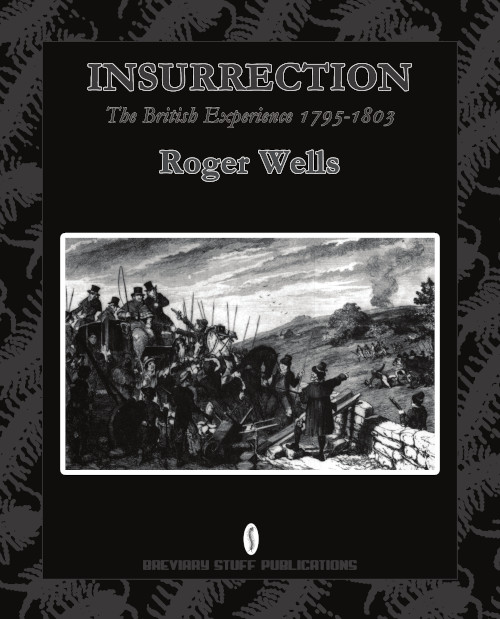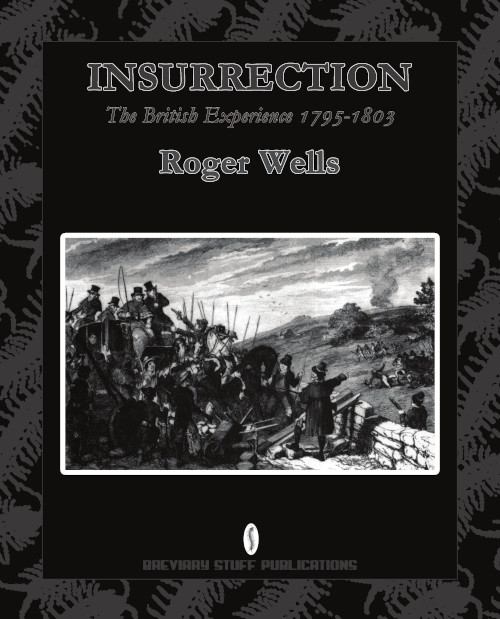- Abbreviations
- Acknowledgements
- Introduction: Historians and the Insurrectionary Threat in Britain, 1795-1803
- 1 Britain and Ireland in the 1790s
- The Question of Political Reform
The Ascendancy, Capitalism and Social Tension in Ireland
Organised Opposition to the Ascendancy 1790-94
The Radicalism of the United Irishmen 1793-95
France, the United Irishmen, and Fitzwilliam’s Failure 1794-5
The United Irishmen become a Mass Movement 1795-6
Britain in the Early 1790s
The Identification of a Common Enemy; British and Irish Radicals in the mid-1790s - 2 The British Secret Service, 1795-1803
- 3 Repression in Action and the Genesis of the First Insurrectionary Movement, 1795-6
- British Radicalism and the “Gagging Acts”
Trade Unionism and Popular Political Aspirations
Irish Nationalists and the French, 1796
Dublin Castle on the Offensive 1796
The UI-Defender Alliance
UI Organisation and the Bantry Bay Episode - 4 The Political Crisis in Britain, January to July 1797
- Peace and Reform Proposals
The Creation of Insurrectionary Cells in Britain - 5 The Naval Mutinies of 1797
- Recruitment
Politics and the Seamen
Sailors’ Conditions and the First Mutiny
The Second Mutiny
The Mutinies at the Nore and Yarmouth
Historians and the Mutinies
The Government’s Investigation
The Mutineers’ Political Connections
The Peace Movement in the Navy
The Revolutionary Movement in the Navy
Political Approaches to the Army
Aftermath - 6 The Containment of the Revolutionary Threat and the Government's Counter-measures, July 1797-April 1798
- The Offensive against the United Irishmen 1797
The Problems of the United Irishmen 1797
The Attempts to cement a British-Irish Insurrectionary Alliance
The Militants seize Control of the UI Leadership - 7 The Insurrectionary Challenge, 1798
- The Insurrection in Ireland
Mutinies in the Navy
The British Dimension
The Significance of Failure - 8 The Legacies of 1797-9
- British and Irish Insurrectionaries in the Throes of Failure, late 1798-1799
The Legacies
The Political Situation at the End of 1799 - 9 The British 'Pact de Famine' and the Crisis of Confidence in the Pitt Ministry, 1800
- 10 The Renewed Democratic Offensive, 1800-1
- The Jacobin-Inspired Panic in the West Midlands
The Mass Petitioning Movement and Contiguous Developments, December 1800 to May 1801
The Mass Meetings of April and May 1801, and the Government’s Counter-Offensive - 11 The Revolutionaries: Colonel Despard, the Union Britons and Robert Emmet, 1801-3
- The Creation of the United Britons in the North
The Revival of the United Britons in the North, January to August 1802
The Culmination of the Despard Conspiracy, June to November 1802
The Return of War and Robert Emmet, 1803 - 12 Conclusion: The Politics of Insurrection
- Index
Roger Wells – Insurrection
The British Experience 1795-1803
£22.00
A re-evaluation of the hoary problem of the question of revolution in Britain and Ireland during the allegedly dying years of the Age of Revolution. On the 16 November 1802 a posse of Bow Street Runners raided the Oakley Arms, a working class pub in Lambeth, on the orders of the Home Office. Over thirty men were arrested, among them, and the only one of any social rank, Colonel Edward Marcus Despard. Despard and twelve of his associates were subsequently tried for high treason before a Special Commission, and Despard and six others were executed on 21 February 1803. It was alleged that they had planned to kill the King, seize London and overturn the government and constitution. Until recently this event had been almost entirely neglected by historians, principally on the grounds that it was an isolated occurrence, the brainchild of a disgruntled and probably insane Irishman. The incident is relegated to a footnote in the relevant volume of the Oxford History of England and even then only in support of First Minister Addington’s habitual ‘calmness’. Apologists speedily claimed that Despard was just another dupe of the supposedly notorious hoard of informers and agents-provocateurs employed by the younger Pitt and his supposed lackey, Addington, to support their outrageous assault on the constitutional freedoms and rights of Englishmen. One pamphlet attacking the revelations of the infamous Oliver the Spy, typically claimed that in 1817 Oliver was ‘by no means a novice in matters of treason, but … was closely and deeply implicated in the mad schemes of Colonel Despard’. These views, that any insurrectionary activity manifested by Englishmen was either the product of insane individuals or the manipulations of secret-service agents, or both, rather than an indigenous phenomenon, were also adopted by Whig and Fabian historians. The first coherent reappraisal of the Despard affair was provided by E. P. Thompson, in his magnificent work, The Making of the English Working Class. An integral part of Thompson’s thesis hinges on his analysis of what happened to one seminal political development in the 1790s, namely the first primarily English working-class movement for democracy. E. P. Thompson’s claim that determined physical force revolutionary groupings originated after the suppression of the Popular Democratic Movement in 1795 has been seriously challenged by conventional British historians. This book offers a reinterpretation of Thompson’s evidence, through a detailed overall study of post-1795 British politics. It throws new light on the organisation of government intelligence sources, Pitt’s repressive policies and machinery, and oscillating popular responses; all developments, including recrudescences of the open Democratic Movement, and notably the emergence of insurrectionary conspiracies, are firmly related to both events in the critical Irish theatre, and the course of the war against France.




